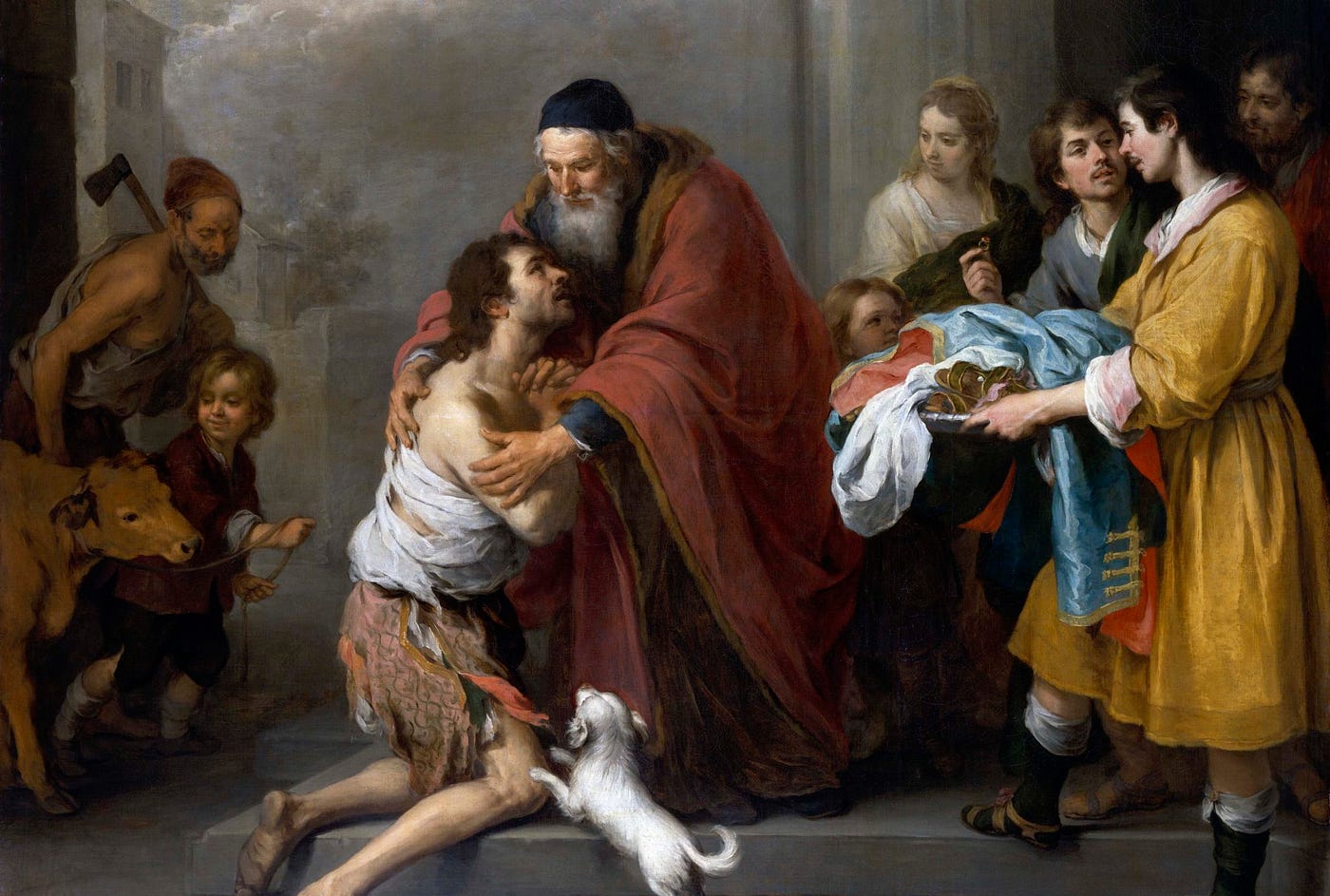INTRODUCTION
Today we want to study the most neglected part of the parable of the prodigal son, which relates to the older son. The main lesson the Lord was teaching the Pharisees and the Scribes is contained in the attitudes of the older son.
LESSONS FROM THE ATTITUDES OF THE OLDER SON
1. His relationship with his father was based on works and merit (Lk. 15:29). He points out to his father that he has always being obedient and working so he had earned himself a party.
▪︎Christians should know that the blessing we received from God is not according to our own efforts but by His mercy and grace. Check Rom. 9:16.
2. He found service a toil instead of a joy (Lk. 15:29). He was certainly a good worker and not lazy but he thought of himself a slave, instead of a son that he truly is.
▪︎Believers should not serve God with the energy of the flesh but learn to do less themselves so that God may do more through them. Look up Phil. 2:13; 4:13.
▪︎Service to God should be seen as a privilege and not a burden, and should be done in joy. Check Ps. 100:2; Heb. 12:28-29.
Reflection: Is there any difference between working for God and working with God? Explain.
3. He was dominated by SELF (Lk. 15:29).
(a) He was self-righteous. Truly he had not done awful things his brother is guilty of but his “holier-than-thou” attitude is not a kingdom virtue. Compare Lk. 18:11-12.
(b) He was self-centered. Take note of the words “I”, “me”.
▪︎Are you always talking about yourself, of your experience and achievements? Do you always or sometimes want to be the centre of attention? Those are the manifestations of MR. SELF.
(c) He was full of self-pity. He acted like a baby, making a sad and sorry spectacle of himself. Compare 1Cor. 3:1-2.
▪︎The cure for self-pity is to fix our eyes on Jesus. See Heb.12:2.
(d) He was self-satisfied. He was content with his efforts to obey his father’s orders.
▪︎This is a picture of one (a believer) still living in bondage to the law. Check Rom. 8:15-17.
4. He was full of ingratitude (Lk.15:29).
As the older son, he had received the larger part of his father’s property (two-third) yet he was complaining. He perceived his father as being stingy and unfair.
▪︎Worldly Christians are not grateful for many blessings they have in Christ but focus only on what they have not received. Check Eph.1:3-5. Compare Gen. 2:16-17; 3:6.
▪︎Carnal Christians see God as being unfair by accepting tax collectors and sinners into His family and blessing them who are undeserving.
5. He was filled with envy and jealousy towards his brother (Lk. 15:30). He should have been thrilled with gratitude that his brother had returned but he was consumed with justice and equity.
▪︎Jealousy is a very cruel thing (Prov. 27:4). It is killing (Prov. 6:34-35; SOS 8:6b). It is a symptom of carnality (1Cor. 3:3), and can starve one of joy and peace.
▪︎Believers should be filled with gratitude for repentant sinners rather than being jealous and envious of the grace they would enjoy by returning to God, in place of condemnation and punishment they deserved.
6. He showed no concern or sympathy for the lost (Lk.15:30). He preferred his brother remain an outcast rather than returning and having a place in the home. He severed kinship with his brother. “…this your son..”
▪︎Christians should be filled with sympathy and loving concern to see sinners saved and to help restore the backslider.
▪︎Any one who claims to be in the light but hates his brother is still in darkness. Look up 1Jn. 2:9-11.
▪︎Believers and repented sinners are both brothers and co-heirs in the kingdom.
7. He does not understand grace and has no room for forgiveness (Lk. 15:30). The demonstration of grace by his father made him angry (Lk.15:28).
▪︎Grace and forgiveness is quite necessary and appropriate. “meet that we should make merry” (Lk.15:32).
▪︎Believers should rejoice and celebrate on the return of every sinner.
8. He was out of sympathy with his father and didn’t share his father’s burden. He rather picked up argument and quarrel with his father.
▪︎Instead of being content for sinners to remain in the far country and to die in their sins, believers should share the passion, the love, and the spirit of our Master. Look up Matt. 9:36; Lk. 19:10.
9. Rather than enjoy fellowship with his father, brother and the community, he stayed outside the house and nursed his anger.
▪︎Believers should not harbour bitterness in their hearts to the extent of choosing misery and isolation over restoration reconciliation.
10. The remedy for worldliness and self-centeredness is found in the amazing and tender words of the father (Lk. 15:31):
(a) “My son..” (Privilege)
▪︎Christians should rise to the full dignity of their high calling in Christ as sons of God and act accordingly. Compare 1Jn. 3:1-3.
(b) “You are always with me….” (Position).
▪︎Christians are heavenly people with Christ (Eph. 2:6). It is therefore unworthy for heavenly citizens to be so earthly minded. See Col. 3:1-3.
(c) “Everything I have is yours…” (Possessions).
▪︎God has given everything to us in Christ. We only need to be conscious of it and posses our possessions, instead of being envious of others’ blessings and gifts. If you’re not receiving, it’s because you’re not asking. Look up 2Pt. 1:3; Jn. 16:24; Matt. 7:7.
CONCLUSION
The older son lives today! He is presented as a “son”, meaning a believer, but a carnal one he is. Born again (Jn. 1:12-14) but worldly (1Cor. 3:1-4). Saved but dominated by self. Examine yourself, are you the older son? Repent today and forsake the attitude of the older son. May the Lord help all of us so to do in Jesus’ name.




